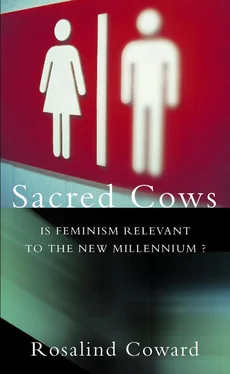Nor were men so willing to accept feminism’s version of themselves; the days of genial masochism were over. In the 1970s they might have shared a sense of themselves as consistently advantaged over women. Now many were questioning this, alongside a growing belief that women have wrested power and advantages from those who are already diminished. As this new mood began to surface, feminism could have re-evaluated its previous assumptions. Instead, it tried to fit the changing landscape into the old models, ridiculing the idea of a male crisis, and taking men’s complaints as further proof of their intransigence. What else would you expect from threatened potentates? This was typical of feminism’s reluctance to let go of certain fundamental tenets: the insistence on the primacy of gender, a reluctance to rethink power relations, a refusal to abandon those old assumptions about oppression.
Only one writer came up with a viable idea to deal with this new male mood, but what a useful idea it was! ‘Backlash’, a term taken from the title of Susan Faludi’s book (1991), threw feminism a lifeline just when it might have sunk. In many ways, Backlash, the book, is impressive. It has a firm grasp of the social and economic movements of the 1980s. Faludi looks both at the cultural representations of women, in newspaper articles, films, sitcoms and so on, as well as at the minutiae of women’s earnings and women’s political activities. Setting the two against each other, she concludes that women’s political and economic progress was paralleled by a series of growing preoccupations which operated to undermine women’s progress – stereotypes such as the childless career woman who is not only a tragic figure but also potentially a mad and dangerous one, as portrayed by Glenn Close in the film Fatal Attraction (1987).
When Faludi interpreted expressions of hostility to feminism in terms of a backlash against women’s achievements, however she handed feminism a most impressive weapon against accepting that society had really changed. From her perspective, it was possible to interpret any number of phenomena, from films to newspaper concerns with career women, to hesitancy over positive discrimination programmes, as manifestations of a deeper underlying principle: male resistance to female progress. With a concept like this to play with, the idea that a new order might emerge from women’s changing status interacting with rapid changes in men’s lives was simply ruled out of court. What remained intact was the idea of men’s structural power over women which they would fight to hold on to at all costs. For many feminists, the idea that all men have power over all women remains fundamental, in spite of male protests to the contrary. From this perspective, the proposition that men might be experiencing some kind of crisis of their own is just part of an attempt to derail the needs of the truly powerless group.
Here I could see I was seriously travelling in a different direction. Many women fell on the idea of backlash as the new feminism, whereas I disliked its assumption that men would inevitably seek to oppose and challenge women’s equality. But I wasn’t surprised that the idea was so popular. Such assumptions were everywhere, especially in what I have called ‘womanism’, a sort of popularized version of feminism which acclaims everything women do and disparages men. Womanism is feminism’s vulgate. It asserts that women are the oppressed or the victims and never the collaborators in the ‘bad’ things that men do. It entails a double standard around sexuality where women’s sexual self-expression is seen as necessary and even desirable, but men’s is seen as dangerous or even disgusting. Womanism is by no means confined to a tiny, politically motivated bunch of man-hating feminists, but is a regular feature of mainstream culture. It fuels the tabloids and the broadsheets alike. Womanism is a convenient response to many of the uglier aspects of the great convulsions shaking modern society; the very convulsions that are, in other aspects, delivering what feminism demanded.
Of course, many men, especially social commentators, have not responded any better. They have indulged in nostalgia and made various attempts to push the genie back into the bottle. They made it easy for feminism to justify ignoring the changes. But both sides seemed to me to be insisting that there was only one relevant question for understanding sexual relationships: given the gender divide, which sex has power?
I knew that I had finally crossed some invisible boundary when, after New Labour came to power in May 1997, I began to feel so ambivalent about the activities of feminists at the highest level of government. The establishment of a women’s unit and the appointment of a women’s ministry did not fill me with joy and enthusiasm, nor did the sight of ‘Blair’s Babes’, the huge increase in the number of female MPs ensured by the policy of all-women shortlists. Of course I was pleased to see all those women at last changing the appearance of the Houses of Parliament and promising to change the culture too. I ought to have been delighted to see people with the same history as myself now able to argue the feminist corner, fighting for greater equality between the sexes of all levels of society. So why feel uneasy?
This was not the usual radical unease – that feminists in government are prepared to do too little, are too cautious, too ready to kowtow to the limitations imposed by a government determined to carry majority consent with it at all times; instead, it was caused by the conflict between the certainties of this new feminist regime and my own perception that there were real social changes underway no longer easily understood by these feminist ideas. I thought we needed to look at what was happening to the sexes, without the preconceptions that one group still has power and the other needs special privileges to compensate for this. Yet here was a women’s unit confidently telling us it would champion ‘women’s interests’, apparently taking it for granted that we all knew what these were, so that we would finally be on the way to that elusive equality. The unit took for granted as truth that very rhetoric which I was beginning to question.
While these tendencies were steadily building a power base, I had been travelling in the opposite direction. I’d let go of the fundamental proposition that women are by definition oppressed. I began to wonder what it means to have institutions fighting for ‘women’s interests’ at the beginning of the new millennium. But no discussion was forthcoming. Everyone seemed to know what women’s interests were, from types of childcare, through assumptions about what women want and what men are, to the continued need for privileging women in order to further their equality. In contrast, I wanted a more honest appraisal about whether women are consistently discriminated against and what different women really want now in terms of work, childcare and mothering.
Once you let go of feminism’s fundamental propositions, the world looks very different. In the West in the 1990s the meaning of gender has changed and so too has its significance in relation to other aspects of society. Interpreting these changes from the perspective of an unchanging model of male power seemed to be less and less tenable. Instead I could see situations where men were really becoming vulnerable and women potent. And I was worried that because it did not share this realization, feminism could end up allying itself with socially divisive and bigoted ideologies which attack and blame poor men for all society’s problems.
So this is the complex context of men’s and women’s relationships as we enter the new millennium. Many aspects of the feminist vision are within grasp but not in the form originally envisaged. Instead of the rout of men sought by the radical feminists or the cosy co-operation envisaged by the socialist feminists, the 90s has been a sexually uncomfortable and sometimes antagonistic time. Oliver James, the psychiatrist, has described it as a time of ‘gender rancour’. There is much confusion about how to interpret this antagonism and neither sex has covered itself in glory when trying to do so. Some women have fallen back on old simplicities about men’s power and women’s moral superiorities. Some men have called for traditional solutions so that they can feel comfortable again.
Читать дальше












